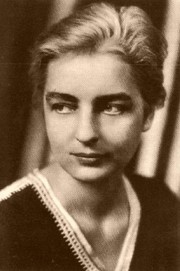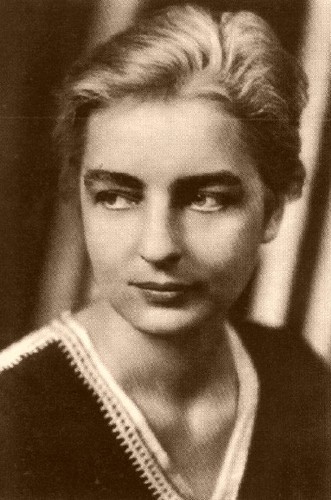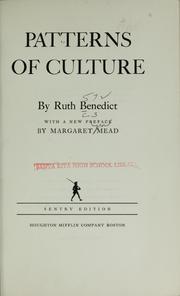Ruth Benedict (born June 5, 1887, New York, N.Y., U.S.—died Sept. 17, 1948, New York City) was an American anthropologist whose theories had a profound influence on cultural anthropology, especially in the area of culture and personality.
Benedict graduated from Vassar College in 1909, lived in Europe for a year, and then settled in California, where she taught in girls’ schools. In 1914 she returned to New York City.
For some years Benedict sought vainly for an occupation. In 1919 she enrolled at the New School for Social Research, where the influence of Elsie Clews Parsons and Alexander Goldenweiser led her to study anthropology under Franz Boas at Columbia University. She approached the field of anthropology from a strong humanistic background, and even after she became involved in the field in the 1920s, she continued to write poetry under the pseudonym Anne Singleton until the early 1930s. From the outset of her career in social science she conceived of cultures as total constructs of intellectual, religious, and aesthetic elements. She received her Ph.D. in 1923 for her thesis on a pervasive theme among North American Indians, The Concept of the Guardian Spirit in North America (1923). In 1924 she began teaching at Columbia.
Benedict’s first book, Tales of the Cochiti Indians (1931), and her two-volume Zuñi Mythology (1935) were based on 11 years of fieldwork among and research into the religion and folklore of Native Americans, predominantly the Pueblo, Apache, Blackfoot, and Serrano peoples. Patterns of Culture (1934), Benedict’s major contribution to anthropology, compares Zuñi, Dobu, and Kwakiutl cultures in order to demonstrate how small a portion of the possible range of human behaviour is incorporated into any one culture; she argues that it is the "personality," the particular complex of traits and attitudes, of a culture that defines the individuals within it as successes, misfits, or outcasts. Six years later, with the publication of Race: Science and Politics, she refuted racist theory. From 1925 to 1940 she edited the Journal of American Folklore.
During 1943–45 Benedict was a special adviser to the Office of War Information on dealing with the peoples of occupied territories and enemy lands. Her long-standing interest in Japanese culture bore fruit in The Chrysanthemum and the Sword (1946). She returned to Columbia in 1946, and in 1947 she was president of the American Anthropological Association. By that time she was acknowledged as the outstanding anthropologist in the United States. Benedict became a full professor at Columbia in 1948, and that summer she began her most comprehensive research undertaking as director of a study of contemporary European and Asian cultures. Upon her return from a trip to Europe, however, she fell ill and died (Britannica).
Ruth Fulton Benedict was an American anthropologist and folklorist. Benedict held the post of President of the American Anthropological Association and was also a prominent member of the American Folklore Society (Wikipedia).
Ruth Benedict (1887-1948) was one of the most eminent anthropologists of the twentieth century. Her profoundly influential books Patterns of Culture and The Chrysanthemum and the Sword: Patterns of Japanese Culture were bestsellers when they were first published, and they have remained indispensable works for the study of culture in the many decades since (Amazon).
69 works Add another?

Most Editions
Most Editions
First Published
Most Recent
Top Rated
Reading Log
Random
Showing all works by author. Would you like to see only ebooks?
Subjects
Anthropology, Race, Social life and customs, Civilization, Zuni Indians, Race relations, Japanese National characteristics, Kwakiutl Indians, Indians of North America, Primitive societies, Culture, Racism, Ethnology, Anthropologie, Biographies, Biography, Collected works, Dobu island, Ethnopsychology, Femmes anthropologues, Folklore, Indian mythology, Manners and customs, Primitive Society, Religion and mythologyPlaces
Japan, Dobu Island (Papua New Guinea), United States, Dobu Island, North America, Thailand, États-Unis, Dobu (Papouasie : Île), Dobu (Île), Japon, Japón, Kwakiutl, Netherlands, New Mexico, Papouasie, Papua New Guinea, Zuni (Volk), ri benPeople
Ruth Benedict (1887-1948)Time
Japanese cultureID Numbers
- OLID: OL954509A
- ISNI: 0000000121450711
- VIAF: 100168390
- Wikidata: Q228822
- Inventaire.io: wd:Q228822
Links outside Open Library
Alternative names
- Ruth Fulton Benedict
- Benedict, Ruth
| November 7, 2024 | Edited by tannumishra2201 | Edited without comment. |
| November 7, 2024 | Edited by tannumishra2201 | Edited without comment. |
| November 7, 2024 | Edited by tannumishra2201 | Author description |
| September 27, 2020 | Edited by MARC Bot | add ISNI |
| April 1, 2008 | Created by an anonymous user | initial import |





